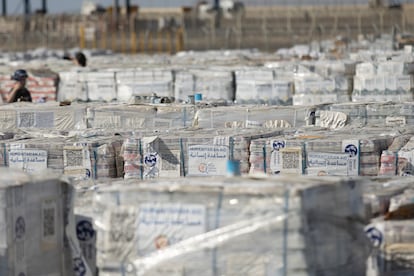The sand scorches under the scorching sun at Al Mawasi camp, but three-year-old Hamza barely notices. His tiny hands squeeze handfuls of earth, which he throws at his mother as he waves a palm frond like a weapon. “I’m hungry, I want food!” he cries in broken Arabic, his voice cracking with desperation.
Wafa Mohammed kneels beside her youngest son as he collapses from exhaustion. The boy's outburst will continue from that afternoon until the next day's only meal: a few spoonfuls of lentils shared among six family members. For 11 days, none of them has tasted bread, a staple food that became the pillar of subsistence when other foods became scarce. Now, there is no flour, so bread has disappeared completely.
“This is by far the worst hunger situation we have ever experienced,” this mother of five tells EL PAÍS. “Since the war began, we have counted every bite we could afford at each meal, because we never knew when the next one would arrive. But now we know there is simply nothing to eat,” she says with helplessness and frustration, while trying to calm her son. At least 127 people have died of hunger in Gaza, many of them in recent days. The Gaza government warned this Saturday that more than 100,000 children, including 40,000 babies, face the “threat of death.”
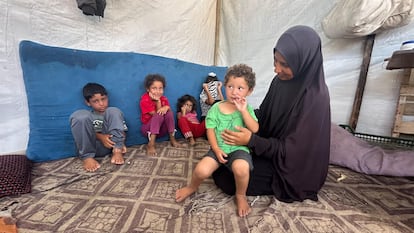
“Where is the world that claims to care about human rights?” Mohammed cries, her voice echoing throughout the IDP camp. “They are complicit in the occupation’s extermination,” the woman exclaims.
Now we know there is simply nothing to eat
Wafa Mohammed, Palestinian mother
The scene of children crying from hunger is repeated daily throughout Gaza, where more than two million Palestinians face what experts from the United Nations and other international organizations have described as an intentionally induced hunger situation. Since March 2, Israel has closed all crossings into the Strip, almost completely cutting off the food supply to one of the most densely populated areas in the world. Not even infant formula, the only food along with breast milk that newborns can consume, has crossed the Israeli blockade, according to UNICEF.
While some Western governments are demanding aid, few have taken concrete steps. Last Monday, a group of 25 countries, later joined by three more, called for an immediate end to the conflict, but effective pressure on Israel remains weak. The convoys that manage to cross barely cover the needs. In April, the UN estimated that at least 500 trucks were needed daily. By mid-July, fewer than 100 were entering.
Mohammed pulls back a thin blanket to reveal his eldest daughter's abdomen. Amna, 12, weighs just 18 kilos, less than half her pre-war weight. Her ribs stick out sharply beneath her almost transparent skin, and she can barely speak above a whisper."I eat a few spoonfuls of lentils or pasta a day and sustain myself mostly on water," says Amna, embarrassed by her condition."I try to give my share to my siblings, who are constantly crying from hunger."
In Gaza, children have been forced to become caregivers amid a crisis that has upended all social norms. Amna feels responsible for her four younger siblings: Rashid, who has also lost half his weight; seven-year-old Asmaa; five-year-old Sama; and little Hamza, whose tantrums are now the daily soundtrack to her suffering.
Since the Israeli offensive began on October 7, Wafa Mohammed's family has had to move seven times. Their home was destroyed in an Israeli bombardment. With her father unemployed since the war began, their savings dwindled with each move. Now they survive, or try to, on whatever they can find or what someone can share."I haven't received my family's flour ration from UNRWA [the UN agency for Palestinian refugees] since before March, and I don't have the money to buy enough," Wafa explains."I used to buy one or two kilos, but the siege has tightened, and we can't buy anything anymore, especially because some products reached prices dozens of times higher than normal."
Even support among neighbors has collapsed, she adds. “We can't even ask for help from nearby displaced families because they all face the same hunger. The situation is beyond the capacity of any parent to handle,” exclaims this displaced mother.
Before the total blockade, the UN operated some 400 food distribution points in the Strip. Today, only four remain active, managed by the newly created Gaza Humanitarian Foundation, an Israeli-controlled entity that Palestinian and international organizations describe as a propaganda tool. They are so dangerous that many families avoid them: since they began operating, they have become scenes of almost daily killings, according to a statement from more than 100 local and international organizations.
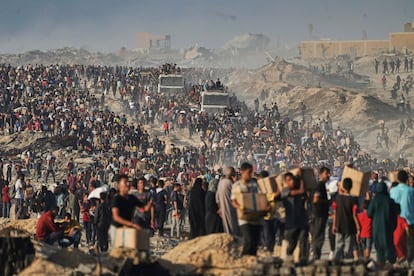
According to United Nations data, as of July 13, 875 Palestinians have died while searching for food: 201 were killed on aid routes and the rest at the distribution points themselves. Figures from recent days place the death toll above 1,000. And at least 6,000 have been injured. At the same time, Israeli forces have forcibly displaced nearly two million people, confining the Palestinian population to less than 12% of Gaza following a new mass evacuation order issued on July 20. The World Food Programme has warned that current conditions make its operations"unviable." "Starvation of civilians as a method of warfare is a war crime," the NGOs emphasize in their statement.
“We sleep hungry, we wake up hungry”
Twenty kilometers from where Wafa Mohammed's family survives, in a barely supported tent near the Gaza coastal road, 65-year-old Jamal Ammar has developed his own survival strategy. He recites verses from the Quran to his granddaughters in a desperate attempt to distract them and make them forget their hunger pangs.
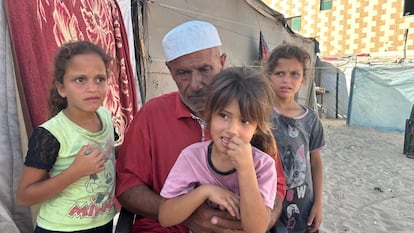
“In the name of Allah, the Compassionate, the Merciful,” he recites in his worn voice, almost drowned out by the noise of the makeshift shelter. Five little girls huddle around him, orphaned since their father, Abdul Rahim, was killed in an Israeli bombing raid last October. Two-and-a-half-year-old Farah constantly interrupts, her small, insistent voice: “Bread, Grandpa, bread.” Ammar’s heart breaks every time. Bread has become almost impossible to find, even for those with money.
The grandfather tells stories in classical Arabic and fills water bottles to create the illusion of full stomachs. But his tricks rarely work for long. Twenty-five family members—children, grandchildren, sons-in-law—share a kilo of lentils when they manage to get hold of it. Each person gets about three spoonfuls. “We barely get a few bites each. We go to sleep hungry, wake up hungry, and spend the day and night hungry, but what hurts the most is when the children ask for bread or something to eat and there’s nothing,” the man laments.
Will the world remain silent in the face of our slow death without doing anything real?
Jamal Ammar
The Hamas-controlled Gaza Health Ministry reports that unprecedented numbers of citizens in extreme exhaustion are arriving at emergency services. Hundreds face"inevitable death from starvation" as they have reached the limit of what their bodies can endure, the ministry warns. According to its data, more than 59,000 people have died in the Strip since October 7, 2023, including nearly 18,000 children.
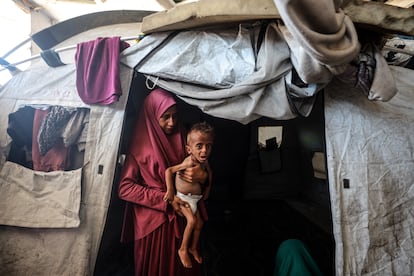
Ammar has lost 16 kilos in three months. He has dark circles under his eyes, and his clothes hang loosely on his increasingly thin body. Even so, he continues with his daily routine of distraction and hope. “These are continuous attempts to make the children forget about hunger, even if only for a while,” he explains. He adds, “We usually fail, but we don't lose hope as long as there is no other food alternative.”
Tears begin to stream down his face as his voice fills with anger. “Why are they starving us? Will the world remain silent as we slowly die, doing nothing real? Where is Europe, which last week promised aid but imposed no sanctions on Israel? Why don’t countries like Spain or Ireland, for example, push harder to bring in food?” the grandfather asks.
This hunger is no accident. Mohammed Abu Jayab, editor-in-chief of the Gaza-based newspaper Al-Iqtisadia, calls it “Israeli management of hunger operations to generate popular pressure and achieve political gains at the negotiating table with Hamas.”
Barham al Qarra, director of Rahma Worldwide's Gaza office, saw his organization's humanitarian work collapse overnight. During January and February 2025, Rahma had distributed 754 truckloads of aid in Gaza, containing vegetables, fruit, medical supplies, chicken, cleaning supplies, canned meat, shoes, flour, tents, blankets, winter clothing, mattresses, rice, and dialysis equipment. Now they are unable to operate at all.
His organization has hundreds of aid trucks waiting in Egypt, Jordan, and Israel. Only Israeli authorization prevents their entry.
“There is no food in Gaza, absolutely none,” says Al Qarra. “Everyone in Gaza is hungry. We don’t have time to waste: Gazans could die of starvation at any moment.”
